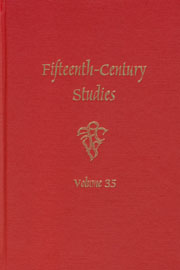Book contents
- Frontmatter
- Contents
- Preface
- Essays
- 1 Violencia en tres cuentos hagiográficos de la España medieval
- Physical Impairment in the First Surgical Handbooks Printed in Germany
- Serious Elements in Medieval French Farces: A New Dimension
- Narrative Afterlife and the Treatment of Time in Henryson's Testament of Cresseid
- Euclid in Boethius's De Consolatione Philosophiae and Some of its English Translations
- Seeking the Medieval in Shakespeare: The Order of the Garter and the Topos of Derisive Chivalry
- A Revelation of Purgatory and Chaucer's Prioress
- Eyeglasses for the Blind: Redundant Therapies in Meschinot and Villon
- Jean de Meun in the Cité des Dames: Author versus Authority
- The Festival Context of Villon's Pet au Deable: Martinmas in Late-Medieval Paris
Euclid in Boethius's De Consolatione Philosophiae and Some of its English Translations
from Essays
Published online by Cambridge University Press: 12 September 2012
- Frontmatter
- Contents
- Preface
- Essays
- 1 Violencia en tres cuentos hagiográficos de la España medieval
- Physical Impairment in the First Surgical Handbooks Printed in Germany
- Serious Elements in Medieval French Farces: A New Dimension
- Narrative Afterlife and the Treatment of Time in Henryson's Testament of Cresseid
- Euclid in Boethius's De Consolatione Philosophiae and Some of its English Translations
- Seeking the Medieval in Shakespeare: The Order of the Garter and the Topos of Derisive Chivalry
- A Revelation of Purgatory and Chaucer's Prioress
- Eyeglasses for the Blind: Redundant Therapies in Meschinot and Villon
- Jean de Meun in the Cité des Dames: Author versus Authority
- The Festival Context of Villon's Pet au Deable: Martinmas in Late-Medieval Paris
Summary
Introduction: The Corpus of Boethius's Writings
Like Aristotle before him, Boethius approached acquiring and recording knowledge systematically, but less comprehensively than his more famous antecedent. Unlike Aristotle, Boethius was more scholar than scientist, as his interests focused on certain well-defined areas of the humanities to the exclusion of the biological sciences. His extant works fall generally into four subject-areas of inquiry: (1) logic, (2) mathematics, (3) theology, and (4) the uniquely comprehensive final work entitled De Consolatione Philosophiae. Boethius's books in these areas established the basic curriculum of medieval education, with its “lower-division courses” of the trivium and its “upper-division courses” of the quadrivium, and they laid the groundwork for scholasticism, which came to define the methodology of teaching and research in the later Middle Ages. Translations of the Consolatio appeared in abundance in the late medieval era; within the work, Lady Philosophy affirms a rational order for the universe, with which Boethius the Prisoner concurs. The production of translations represents one significant aspect of the general attempt to find “real order” underlying the “apparent chaos” of events occurring during the fourteenth and fifteenth centuries in particular, including the political and military confrontations of the Hundred Years' War, social and demographic devastation brought about by the bubonic plague, the rise of nation states and national monarchies, and other changes for which the certainty of universal order would have provided a form of assurance or consolation. One facet of the popularity of the Consolation translations is this affirmation of a universe ruled by a rational deity.
- Type
- Chapter
- Information
- Fifteenth-Century Studies , pp. 70 - 79Publisher: Boydell & BrewerPrint publication year: 2009



